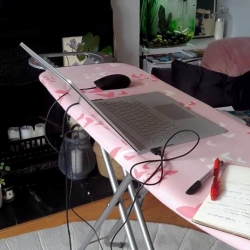To provide the best experiences, we use technologies like cookies to store and/or access device information. Consenting to these technologies will allow us to process data such as browsing behaviour or unique IDs on this site. Not consenting or withdrawing consent, may adversely affect certain features and functions.
The technical storage or access is strictly necessary for the legitimate purpose of enabling the use of a specific service explicitly requested by the subscriber or user, or for the sole purpose of carrying out the transmission of a communication over an electronic communications network.
The technical storage or access is necessary for the legitimate purpose of storing preferences that are not requested by the subscriber or user.
The technical storage or access that is used exclusively for statistical purposes.
The technical storage or access that is used exclusively for anonymous statistical purposes. Without a subpoena, voluntary compliance on the part of your Internet Service Provider, or additional records from a third party, information stored or retrieved for this purpose alone cannot usually be used to identify you.
The technical storage or access is required to create user profiles to send advertising, or to track the user on a website or across several websites for similar marketing purposes.
 WiredScore, is announcing the launch of a new certification for smart buildings aimed at providing clarity, definition and measurement for the growing smart building industry. SmartScore certification was developed in response to increasing demand for guidance around what ‘smart’ really means in relation to commercial buildings, and how it can and should be implemented. (more…)
WiredScore, is announcing the launch of a new certification for smart buildings aimed at providing clarity, definition and measurement for the growing smart building industry. SmartScore certification was developed in response to increasing demand for guidance around what ‘smart’ really means in relation to commercial buildings, and how it can and should be implemented. (more…)







 New research by employee engagement and culture app,
New research by employee engagement and culture app, 
 New research by
New research by 
 Employees experience more bullying on days with higher work pressure and passive avoidant leadership, finds
Employees experience more bullying on days with higher work pressure and passive avoidant leadership, finds 
 A new global survey by CFO Research and
A new global survey by CFO Research and 
 A year of unnecessarily binary conversation about work leads inevitably to this. A stupid question.
A year of unnecessarily binary conversation about work leads inevitably to this. A stupid question. 
 New research by
New research by 
 As the world emerges from the grip of the pandemic, the
As the world emerges from the grip of the pandemic, the 
 More than six in ten UK managers have experienced burnout at work because of the COVID-19 pandemic, with a fifth considering quitting their job as a result, according to new research from
More than six in ten UK managers have experienced burnout at work because of the COVID-19 pandemic, with a fifth considering quitting their job as a result, according to new research from 
 Corporate wellbeing could add £61bn to the English economy by 2025 through added productivity, if UK companies can create new wellbeing strategies and improve underperforming ones, according to a new study by
Corporate wellbeing could add £61bn to the English economy by 2025 through added productivity, if UK companies can create new wellbeing strategies and improve underperforming ones, according to a new study by 










April 13, 2021
After a year of lockdowns, people are burnt-out but happier
by Steven Buck • Comment, Wellbeing